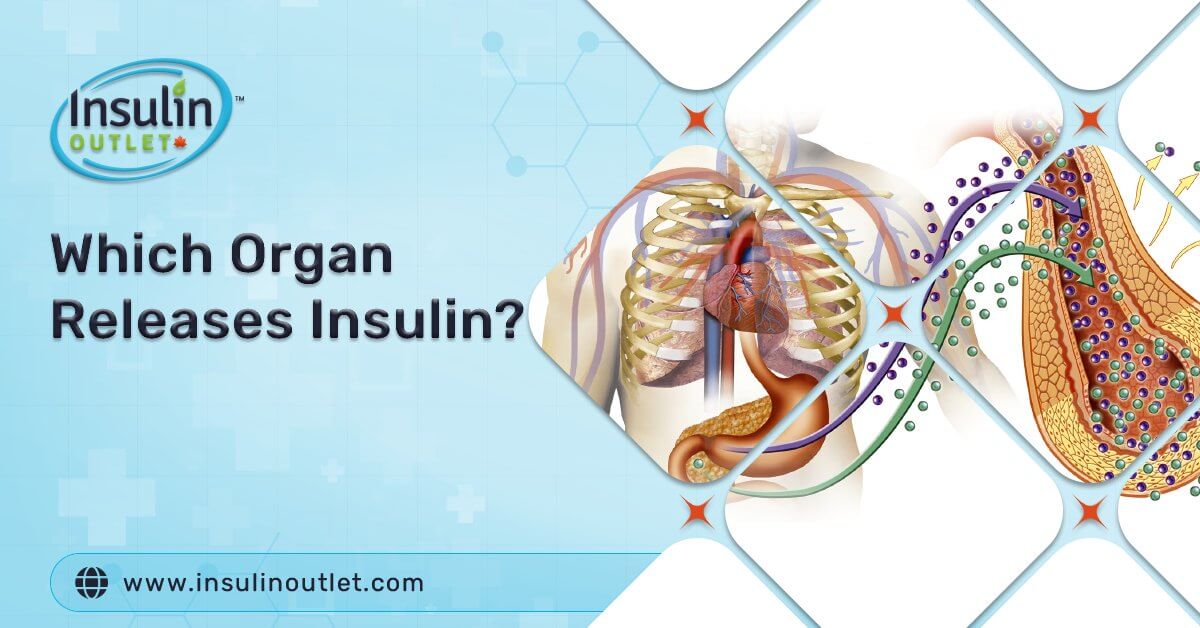
Think back to your high school biology class. Do you remember learning about the key hormones that help regulate blood sugar levels and allow our bodies to process the carbs, proteins, and fats from the foods we eat?
If your memory is a little fuzzy on the specifics, in this quick read, we’ll break down which organ releases insulin and its role in the body.
Table Of Contents
Toggle- What Exactly Is Insulin, and How Does It Function?
- Humalog Mix 25 KwikPens 100 Units
- Fiasp FlexTouch Pens 100 Units / mL
- Apidra SoloStar Pens (100 Units/mL)
- Basaglar KwikPens 100 Units / mL
- What Are the Consequences of Insulin Imbalance?
- What Body Part Makes Insulin?
- What Conditions Can Affect the Pancreas?
- Tips for a Healthy Pancreas
- In Summary
What Exactly Is Insulin, and How Does It Function?
Insulin is a hormone that helps regulate the body’s metabolism. Its primary role is to control the absorption of glucose into the body’s cells so that it can be used for energy. Without insulin, the body’s cells would be unable to access blood glucose which is vital for cell metabolism.
Specifically, insulin stimulates muscle, fat, and liver cells to take up glucose from the bloodstream. It enables these cells to utilize glucose for energy and convert excess glucose into glycogen for storage.
This uptake process helps lower high blood glucose levels after eating. Insulin also facilitates the synthesis of proteins, promotes the conversion of glucose and amino acids into fat for storage, and inhibits the breakdown of fat.
What Are the Consequences of Insulin Imbalance?
Insulin imbalance in the body can lead to several health conditions with varying severity. The three main consequences of improper insulin regulation are:
Hyperglycemia
Hyperglycemia refers to unusual high levels of glucose in the blood. This happens when the body does not produce enough insulin or cannot properly utilize the insulin it produces. Without sufficient insulin to help shuttle glucose into cells, blood sugar levels rise.
Mild hyperglycemia may not cause any symptoms, but severe hyperglycemia can result in increased thirst, frequent urination, blurry vision, fatigue, headache, and nausea.
If left untreated, dangerously high blood sugar can lead to diabetic ketoacidosis, which may progress to diabetic coma or even death.
Hypoglycemia
Hypoglycemia is the opposite condition, characterized by low blood sugar levels. This may be caused by excessive insulin production, higher insulin sensitivity, or reduced food intake.
Symptoms of hypoglycemia include shakiness, anxiety, irritability, sweating, nausea, confusion, dizziness, and fatigue.
Without quick intervention such as consuming fast-acting carbohydrates, hypoglycemia can worsen and lead to fainting, seizures, or hypoglycemic coma.
Diabetes
Chronic insulin imbalances underlie two types of diabetes mellitus. In type 1 diabetes, the immune system attacks and destroys the insulin-producing beta cells of the pancreas. This results in an absolute insulin deficiency.
Type 2 diabetes is marked by insulin resistance, where cells fail to properly respond to insulin. The pancreas initially compensates by overproducing insulin, but over time, it cannot keep up with demand.
Both types of diabetes lead to hyperglycemia and long-term vascular and neurological complications if blood sugar levels are not well controlled. Lifestyle modification and medications, or insulin therapy, are required to manage diabetes.
What Body Part Makes Insulin?
The organ that secretes insulin is the pancreas, which is a glandular organ located in the abdomen behind the stomach. It is part of both the digestive system and the endocrine system.
It contains clusters of cells known as the islets of Langerhans. These islets contain alpha cells that produce glucagon and beta cells that produce insulin.
The pancreas has two main functional components:
- The exocrine pancreas makes and secretes digestive enzymes into the duodenum to help digest proteins, carbohydrates, and fats. Its acini cells produce the enzymes, and the stalk-like pancreatic duct transports them to the duodenum.
- The endocrine pancreas contains the islets of Langerhans that secrete important hormones like insulin and glucagon directly into the bloodstream to control blood sugar levels and regulate metabolism.
What Conditions Can Affect the Pancreas?
The pancreas can be affected by various conditions that impair its ability to produce and release insulin. Some key pancreatic conditions that influence insulin levels are:
Pancreatitis
Pancreatitis is inflammation of the pancreas, often caused by gallstones blocking ducts or excessive alcohol use. Acute pancreatitis can cause temporary impaired insulin production. Chronic pancreatitis causes permanent damage to insulin-creating cells.
Pancreatic Cancer
Pancreatic cancer, especially when localized in the head of the pancreas, can destroy insulin-producing cells. This cancer is difficult to detect early and spreads rapidly.
Cystic Fibrosis
Cystic fibrosis is a genetic disorder where thick mucus accumulates in organs like the lungs and pancreas. The mucus blocks ducts, leading to pancreatic damage and reduced insulin.
Other Disorders
Other less common disorders, like hemochromatosis (iron overload) and autoimmune pancreatitis, can also affect insulin production. Injury to the pancreas from trauma, infection, or surgery may also impair insulin release temporarily or permanently.
Tips for a Healthy Pancreas
A healthy pancreas is important for maintaining normal blood sugar levels through proper insulin production and release.
There are several dietary and lifestyle factors that can help keep your pancreas in good working order.
Dietary Tips
- Eat a balanced, nutritious diet full of lean proteins, fruits, vegetables, and whole grains. Avoid processed and sugary foods.
- Stay hydrated by drinking plenty of water. Dehydration can strain the pancreas.
Lifestyle Suggestions
- Don’t smoke. Smoking significantly increases the risk of pancreatic cancer and other diseases.
- Limit alcohol intake, as chronic heavy drinking is associated with pancreatitis.
- Exercise regularly to help manage blood sugar levels and maintain a healthy weight.
- Manage stress levels through relaxation techniques such as yoga and meditation. High stress may inhibit insulin release.
- Get enough sleep, as fatigue prevents the pancreas from functioning optimally.
- See your doctor regularly, and report any potential pancreatic symptoms promptly. Early detection of any disorders can help preserve pancreas health.
In Summary
Now you know that the organ that secretes insulin is pancreas. In a nutshell, insulin is vital for our bodies to use glucose properly.
Conditions like pancreatitis and pancreatic cancer can disrupt this. So, taking care of our health through good food, exercise, sleep, and stress management is highly important.
And be sure to speak with your doctor if you have any concerns about your pancreatic health.
Share:












